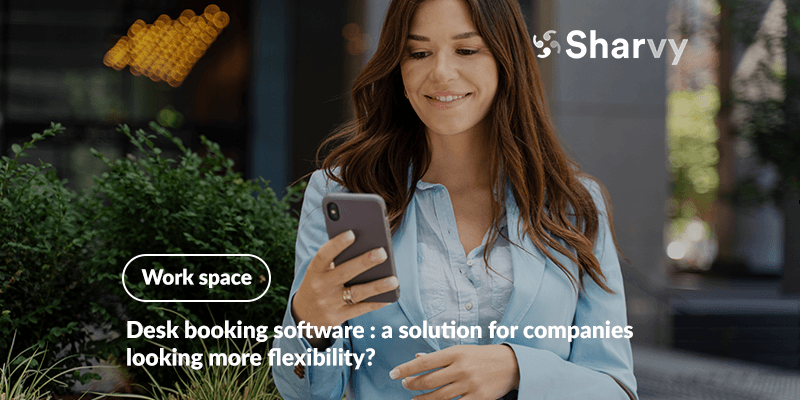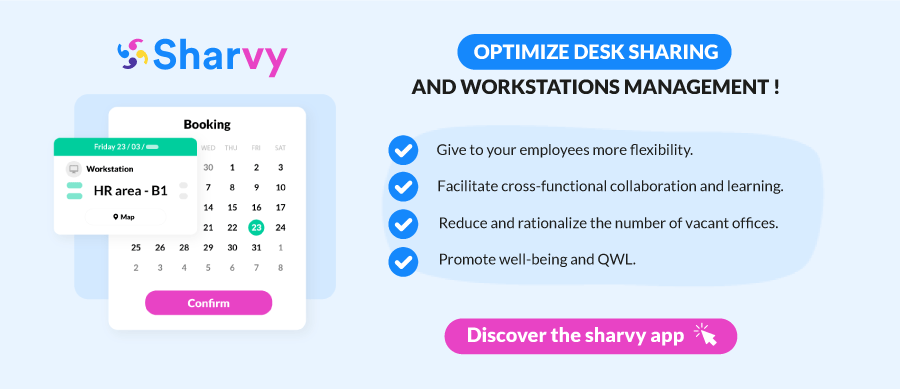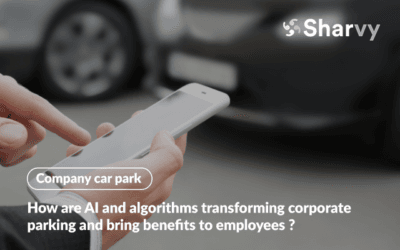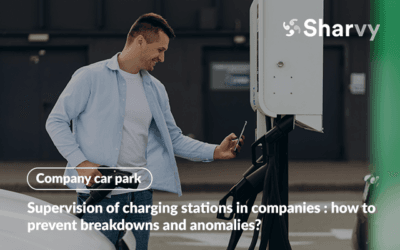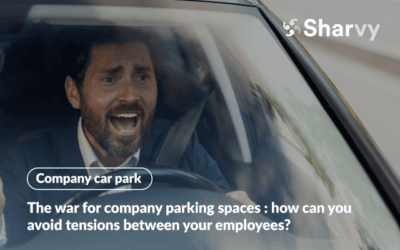There’s no doubt about it : in recent years, traditional offices, once synonymous with an unchanging routine, have given way to hybrid environments where teleworking and face-to-face work share the limelight. More than just a trend, this transformation reflects a profound quest for flexibility and balance, both for companies and their employees.
But how do you effectively manage workspaces when needs are constantly changing? How do you avoid deserted offices on the one hand, and overcrowded spaces on the other? To meet these challenges, many organisations are turning to modern tools, among which office reservation software occupies a central place. Find out more about its benefits and how it works in this article!
The new challenges facing corporate workspaces.
1. The rise of hybrid working and the flex office.
Since Covid-19, hybrid working has become a new corporate norm, while the concept of the flex office (where regular offices are replaced by shared spaces) is gaining in popularity.
As a result, many employees are now dividing their time between the office and teleworking, and companies are having to come to terms with these new habits.
But this flexibility, so appreciated for the well-being and productivity of teams, raises a crucial question: how do you manage workspaces when the presence of employees is constantly changing?
In trying to answer this question, companies are often faced with offices that are sometimes empty, sometimes saturated, highlighting the need for appropriate tools to orchestrate workspaces.
2. Challenges to overcome without desk booking software.
These day-to-day challenges are all the more complex to overcome without the help of office reservation software. Employees (often) find themselves unable to choose the workspace that best suits their needs at the time. For example, it may be common for your employees to want to isolate themselves in a phonebox in search of peace and concentration.
Without a dedicated solution, these spaces (which are often limited in number) run the risk of being occupied haphazardly, or even unused due to a lack of visibility over their availability. The same applies when it comes to reserving a meeting room for a strategic exchange, such as a brainstorming session. These are times when you need to be away from open spaces.
Who hasn’t had the frustrating experience of desperately searching for a free room, only to find that it’s either taken or unsuitable? Without a centralised solution, the time wasted organising these logistical details adds up, to the detriment of productivity and working comfort.
Ultimately, office reservation software doesn’t just manage workstations: it does much more for your staff: it gives everyone the flexibility they need to organise their work smoothly and efficiently.
What is a desk booking software? Definition & how it works.
A desk booking software software is simply an application that allows your employees to choose & reserve a workspace that suits their needs.
Thanks to an intuitive interface like Sharvy‘s, this type of software offers a real-time view of the availability of spaces – workstations, meeting rooms, quiet & collaborative areas – and simplifies their allocation. Each employee can therefore organise his or her day according to his or her specific needs and schedule, while optimising the use of premises for the company.
In practical terms: your employees start by logging in via their personal account, whether from a computer or a smartphone. They can then access an interactive map to view the availability of offices, meeting rooms and other spaces in real time.
Your employees can choose the ideal place : a quiet office to concentrate, a meeting room for an important discussion, or a collaborative area for teamwork.
After specifying the day and duration you want, your staff can confirm their booking in just a few clicks and receive instant confirmation, followed by a reminder when the time is right. Thanks to this system, your employees gain in flexibility & efficiency, while optimising the use of your company’s spaces.
The benefits of a desk booking software for your business!
1. A solution to end the vacancy of your workspaces.
To take full advantage of this benefit, it’s essential to pool your workstations (in other words: calculate an expansion rate specific to your company & your needs). For example, if your company has around fifteen employees, you only need to provide around ten individual workstations.
This implies putting in place an efficient internal organisation, with space management in « rotation », enabling each person to access a workstation according to a suitable schedule.
Admittedly, adopting an approach where the number of workstations is lower than the number of employees may seem bold, or even worrying at first sight. However, it is precisely in this situation that desk booking software makes the most sense.
For example, in a company with 15 employees, offering 10 individual workstations is often enough, because not everyone is in the office at the same time. The software guarantees that everyone can reserve a workspace, turning a potential constraint into a real lever for efficiency and flexibility.
2. Desk booking software gives you the freedom to choose your workspace.
Thanks to a desk booking software, an employee who has to write a complex report can reserve a quiet office, while another, preparing a team meeting, will choose a collaborative zone, with a room equipped with the technology required for the meeting (projector, loudspeaker, whiteboard, etc.).
This flexibility not only offers them greater comfort, but also greater efficiency, because everyone can work in optimum conditions according to their priorities for the day. It’s a truly personalised office experience that promotes well-being and productivity on a daily basis.
3. An innovative solution to break down silos & encourage meetings.
For example, thanks to flexible office management, staff from different departments can find themselves working in the same space, encouraging informal exchanges and spontaneous collaboration.
Imagine a designer and a developer booking neighbouring offices on a given day. This proximity can encourage them to exchange ideas, solve problems together and initiate joint projects.
By facilitating these interactions, the software creates an environment conducive to innovation and cohesion, reducing the barriers between teams and stimulating cross-functional collaboration.
4. An effective method for making financial and environmental gains.
By adopting office reservation software, you can take the opportunity to rethink the organisation of your workspaces to achieve both financial savings & environmental gains.
For example, by sharing workstations rather than having a fixed desk for each employee, you can optimise the use of your premises and reduce the amount of space required. This allows you to rent smaller spaces that are better laid out and enhanced with services that improve the Quality of Life and Working Conditions (QLWC) of your teams.
What’s more, by reducing the surface area you occupy, you reduce your energy costs: for heating, air conditioning and lighting. By combining this approach with teleworking, you can also reduce the number of commutes your employees need to make, thereby limiting the carbon footprint of your business.
A “simple” desk booking software can therefore be a real solution that allows you to reconcile profitability & responsibility.
How to choose your office reservation software? 5 tips!
1. Ease of use.
In your company, you probably have teams made up of employees of all ages, some perfectly at ease with new technologies, others a little less familiar with these tools.
That’s why ease of use should be at the heart of your choice. An intuitive interface, clear steps and fluid navigation are essential if everyone is to be able to use the software on a daily basis without difficulty.
When making your choice, pay attention to the number of clicks required to make a booking, for example. This seemingly insignificant detail is actually a key indicator of the tool’s simplicity and effectiveness. The fewer clicks your employees have to make to reserve a workstation, a room or a collaborative space, the smoother and more enjoyable the user experience will be.
2. A connection with your HRIS software.
It’s essential that your office reservation software can connect to your HRIS software, to simplify the organisation of your employees’ work.
For example, by synchronising your employees’ schedules, the office reservation software can automatically adjust the availability of workstations according to individual absences & teleworking days. This avoids duplication, booking conflicts and unused workspaces.
What’s more, this connection gives you an overview of your teams’ habits, such as their preferences for workspaces and working methods. This data can help you make informed decisions over the long term to optimise your workspaces.
3. Advanced features.
Your business is unique, as are the needs of your employees. What works for another organisation won’t necessarily produce the same results for you.
That’s why, before you begin your search for office booking software, take the time to identify exactly what your teams expect & require. This will enable you to define the essential features that you should prioritise.
Here are a few essential features to consider:
- Intuitive reservation and release of workstations.
- Real-time display of availability.
- Specific search criteria (XXL screen, double screen, etc).
- Simple reservation management (changes & cancellations in just a few clicks).
- Monitor space occupancy rates.
- A dynamic map for easy retrieval of reserved workstations.
- Seamless integration with your HRIS and other in-house tools.
You can also opt for automatic allocation functions based on priority rules and advanced customisation to meet your company’s exact requirements.
4. Scalability & customisation.
To meet your company’s needs (over the long term), your office reservation software needs to be both scalable & customisable.
Just imagine: your teams are growing, your workspaces are changing, and you’re adopting new practices like desk sharing and teleworking. Well, your tool needs to be able to adapt easily to these changes.
What’s more, customisation is a real asset. You need to be able to configure your software so that it faithfully reflects the way your offices are organised, but also so that it incorporates your internal rules, as well as specific functions, such as reserving dedicated areas for certain teams.
This is the case of the IRD (Institut de Recherche pour le Développement), which uses the Sharvy desk booking solution for its Human Resources department. Read the case study to find out more!
As a result, offering this level of flexibility not only allows your staff to get to grips with it more quickly, but also means you can constantly adjust your space management to meet the real needs of your business.
5. A centralised solution : from your company car park to your workstations.
If you adopt teleworking, as well as a flexible organisation such as the flex office, you may find that parking management also becomes an issue. So centralised resource management makes sense.
Indeed, when your employees alternate between working remotely and being in the office, space requirements – whether for offices or parking spaces – become unpredictable.
That’s why a centralised management solution, like Sharvy, lets you optimise both aspects in a single tool!
Your employees can reserve their office for the day and, at the same time, a parking space if necessary. This global approach simplifies organisation, reduces stress for employees who are worried about running out of space, and improves efficiency in the use of your infrastructure.
In conclusion
With desk booking software, you’re not just organising your office space: you’re also giving your employees new freedom and a smoother working experience, tailored to their needs.
It’s an opportunity to transform your offices into a real strategic asset, while enhancing what matters most: the well-being & productivity of your teams. After all, the office of the future starts today, and it’s in your hands.
Have a question? Check the following FAQ!
Is office reservation software suitable for all companies?
Yes, whatever the size of your business, office reservation software can be an asset. Smaller organisations will find it an efficient way of organising their office space, while larger companies will be able to manage multiple sites, large teams & a variety of spaces (phonebox, meeting room & slots, right through to the cafeteria) in a centralised & fluid way.
What happens if an employee forgets to release a reserved space?
Most office booking software, such as Sharvy, offers features to manage this type of situation, such as automatically cancelling unfulfilled bookings & sending reminders before the booked period. This ensures optimum use of space and avoids unnecessary bookings.
What data can be analysed using office reservation software?
Reservation software generally provides detailed reports, such as office occupancy rates, peak occupancy rates, usage preferences (meeting rooms, concentration areas, cafeteria space, etc). These analyses help Work Environment Managers (WEM) to make strategic decisions for the company based on concrete data.
Want to find out more? Check out our latest articles!
How are AI & algorithms transforming corporate parking?
How are AI & algorithms redefining corporate parking? What are the benefits for your company & your employees? Focus!
Supervision of charging stations in companies : how to prevent breakdowns and anomalies?
Why is the supervision of charging stations essential for businesses? How can you prevent breakdowns and ensure their reliability? Focus.
The war for company parking spaces : how can you avoid tensions between your employees?
Company parking spaces : a real headache? Find out how to avoid tensions and put people’s minds at rest in this article!
Subscribe to our newsletter!
Resources
Contact us
+44 117 463 6990

